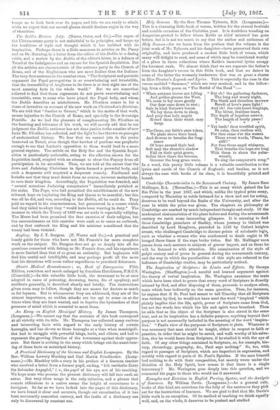The Dublin Review. July. (Barns, Oates, and Co.)—The organ of
the Ultramontane party is not unfaithful to its principles, and keeps up the traditions of style and thought which it has imbibed with its inspiration. Perhaps there is a little sameness in articles on Dr. Pusey and on Dr. Manning, in a letter from the editor of the Dublin to a daring critic, and a review by the Dublin of the editor's letter, in a defence of Tetzel of the Indulgences and an excuse for the Spanish Inquisition. But all the articles are characteristic of the extreme party in the Church of Rome, and of the Englishmen who are more Italian than the Italians. The very first sentence in the number runs, "The Scriptural and patristic argument for Papal prerogatives is so overwhelming and irresistible, that the insensibility of Anglicans to its force is at first sight one of the most amazing facts in the whole world." Bat we are somewhat relieved to find that these arguments do not prove overwhelming and irresistible, even to some who have joined the Papal body, and whom the Dublin describes as misbelievers. Mr. Ffoulkes comes in for a share of invective on account of his new work on Christendom's Divisions. We are told that "Justice to Greece," which is the motto of that work, means injustice to the Church of Rome, and specially to the Sovereign Pontiffs. As we had the pleasure of complimenting Mr. Ffoulkes on the learning and tolerance of his work, we will merely add that in our judgment the Dublin reviewer has not dono justice tothe number of new facts Mr. Ffoulkes has collected, and the light he has thrown on passages of ecclesiastical history. We fear that we cannot join in the praise bestowed on Tetzel, even though that hawker of pardons was prophetic enough to see that Luther's opposition to them would lead to a more general rupture. The article on the Holy See and the Spanish Inqui- sition is particularly noticeable, owing to the affection shown for the Inquisition itself, coupled with an attempt to clear the Papacy from all participation in its atrocities. Thus, we are told at the outset that the Jews and Jndaizing Christians in Spain formed a powerful body, and such a desperate evil required a desperate remedy. Ferdinand and Isabella saw that they must desist from no course, however melancholy, to save their kingdom. Accordingly, the Inquisition was founded, and "several notorious Judaizing conspirators" immediately perished at the stake. The Pope, who had permitted the establishment of the new tribunal, kept on imploring the King and Queen to be merciful ; but this was all he did, and was, according to the Dublin, all he could do. They paid no regard to his remonstrances, but persevered in a course which had they failed to adopt they "would have been wanting in duty." The manner in which the Treaty of 1492 was set aside is especially edifying. The Moors had been promised the free exorcise of their religion, but the encroachments on this exercise were such as to cause an outbreak, and by that outbreak the King and hi minister considered that the treaty had been violated.






























 Previous page
Previous page